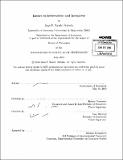| dc.contributor.advisor | Robert Townsend and Ivan Werning. | en_US |
| dc.contributor.author | Xandri Antuña, Juan P. (Juan Pablo) | en_US |
| dc.contributor.other | Massachusetts Institute of Technology. Department of Economics. | en_US |
| dc.date.accessioned | 2013-09-24T19:39:43Z | |
| dc.date.available | 2013-09-24T19:39:43Z | |
| dc.date.copyright | 2013 | en_US |
| dc.date.issued | 2013 | en_US |
| dc.identifier.uri | http://hdl.handle.net/1721.1/81053 | |
| dc.description | Thesis (Ph. D.)--Massachusetts Institute of Technology, Dept. of Economics, 2013. | en_US |
| dc.description | Cataloged from PDF version of thesis. | en_US |
| dc.description | Includes bibliographical references (p. 163-168). | en_US |
| dc.description.abstract | This thesis studies problems of belief and information formation of agents, and its effect on incentive provision in problems of experimental and mechanism design. Chapter 1 is based on joint work with Arun Chandrasekhar and Horacio Larreguy. In this chapter we present the results of an experiment we conducted in rural Karnataka, India, to get evidence on how agents learn from each other's actions in the context of a social network. Theory has mostly focused on two leading models of social learning on networks: Bayesian updating and local averaging (DeGroot rules of thumb) which can yield greatly divergent behavior; individuals employing local averaging rules of thumb often double-count information and, in our context, may not exhibit convergent behavior in the long run. We study experiments in which seven individuals are placed into a network, each with full knowledge of its structure. The participants attempt to learn the underlying (binary) state of the world. Individuals receive independent, identically distributed signals about the state in the first period only; thereafter, individuals make guesses about the underlying state of the world and these guesses are transmitted to their neighbors at the beginning of the following round. We consider various environments including incomplete information Bayesian models and provide evidence that individuals are best described by DeGroot models wherein they either take simple majority of opinions in their neighborhood Chapter 2 is based on joint work with Arun Chandrasekhar, and studies how researchers should design payment schemes when making experiments on repeated games, such as the game studied in Chapter 1. It is common for researchers studying repeated and dynamic games in a lab experiment to pay participants for all rounds or a randomly chosen round. We argue that these payment schemes typically implement different set of subgame perfect equilibria (SPE) outcomes than the target game. Specifically, paying a participant for a randomly chosen round (or for all rounds with even small amounts of curvature) makes the game such that early rounds matter more to the agent, by lowering discounted future payments. In addition, we characterize the mechanics of the problems induced by these payment methods. We are able to measure the extent and shape of the distortions. We also establish that a simple payment scheme, paying participants for the last (randomly occurring) round, implements the game. The result holds for any dynamic game with time separable utility and discounting. A partial converse holds: any payment scheme implementing the SPE should generically be history and time independent and only depend on the contemporaneous decision. Chapter 3 studies a different but related problem, in which agents now have imperfect information not about some state of nature, but rather about the behavior of other players, and how this affects policy making when the planner does not know what agents expects her to do. Specifically, I study the problem of a government with low credibility, who decides to make a reform to remove ex-post time inconsistent incentives due to lack of commitment. The government has to take a policy action, but has the ability to commit to limiting its discretionary power. If the public believed the reform solved this time inconsistency problem, the policy maker could achieve complete discretion. However, if the public does not believe the reform to be successful some discretion must be sacrificed in order to induce public trust. With repeated interactions, the policy maker can build reputation about her reformed incentives. However, equilibrium reputation dynamics are extremely sensitive to assumptions about the publics beliefs, particularly after unexpected events. To overcome this limitation, I study the optimal robust policy that implements public trust for all beliefs that are consistent with common knowledge of rationality. I focus on robustness to all extensive-form rationalizable beliefs and provide a characterization. I show that the robust policy exhibits both partial and permanent reputation building along its path, as well as endogenous transitory reputation losses. In addition, I demonstrate that almost surely the policy maker eventually convinces the public she does not face a time consistency problem and she is able to do this with an exponential arrival rate. This implies that as we consider more patient policy makers, the payoff of robust policies converge to the complete information benchmark. I finally explore how further restrictions on beliefs alter optimal policy and accelerate reputation building. | en_US |
| dc.description.statementofresponsibility | by Juan P. Xandri Antuña. | en_US |
| dc.format.extent | 168 p. | en_US |
| dc.language.iso | eng | en_US |
| dc.publisher | Massachusetts Institute of Technology | en_US |
| dc.rights | M.I.T. theses are protected by
copyright. They may be viewed from this source for any purpose, but
reproduction or distribution in any format is prohibited without written
permission. See provided URL for inquiries about permission. | en_US |
| dc.rights.uri | http://dspace.mit.edu/handle/1721.1/7582 | en_US |
| dc.subject | Economics. | en_US |
| dc.title | Essays on information and incentives | en_US |
| dc.type | Thesis | en_US |
| dc.description.degree | Ph.D. | en_US |
| dc.contributor.department | Massachusetts Institute of Technology. Department of Economics | |
| dc.identifier.oclc | 857791688 | en_US |
